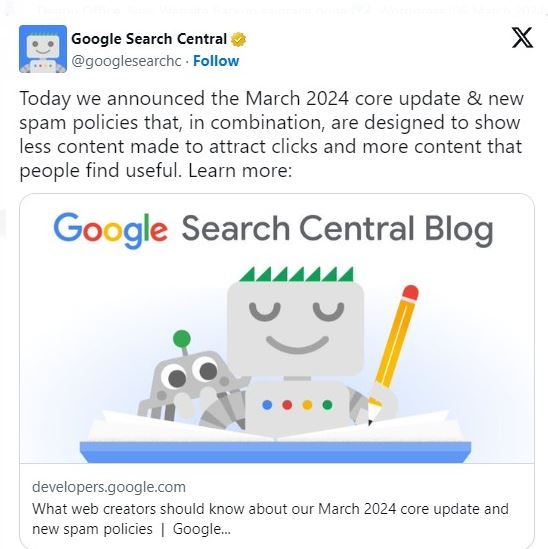
Google Announces March 2024 Core Update & New Spam Policy
Published on: March 9, 2024
On March 5th, Google announced a major update to its search algorithms and spam policies. It seeks to significantly minimize the appearance of information designed merely for clicks while displaying more stuff that users find valuable. Here’s all you need to know.
What is Google’s March 2024 Core Update?

At the end of February, SEO experts began to notice significant instability and swings in Google search rankings. These were far more significant than Google’s regular algorithm updates. Some SEOs reported pages missing from the index, while others saw a significant decline in traffic. Many people suspected that these were early signals of a potential Google search ranking algorithm update—and they were correct. Google has finally released its March 2024 core update.
What Are the Key Aspects of This Core Update?
• It will impact useless pages with poor UX, as well as those that emphasize search engine bots above human visitors. It will also deprioritize pages built to rank for extremely precise search queries.
• It represents a shift in how Google assesses content usefulness. Google no longer employs a single signal or technique to do this. In short, this new upgrade emphasizes the significance of providing content that truly helps and informs consumers, rather than focusing exclusively on clicks.
• Google estimates that this improvement, together with prior efforts, would cut low-quality, unoriginal content in search results by 40%.
What is Google Spam Policy 2024?
Along with the core upgrade, Google is releasing a spam update based on newly implemented spam policies. Google will now penalize users that abuse expired domains, content scaling, and site reputation:
Expired domain abuse: This occurs when you acquire expired domains to host low-quality content while using the domain’s previous reputation.
For example, this may entail acquiring a domain that was previously used by a medical site to produce low-quality betting content. Another example would be to put affiliate content on a website that was formerly utilized by a government body.
Scaled content abuse: This occurs when website owners influence search results by creating vast volumes of unoriginal content (with or without AI techniques) that adds no value to visitors.
Some instances include employing generative AI technologies or scraping search results to generate countless pages with little value for visitors, as well as creating useless content specifically for the sake of ranking for desired keywords.
Site reputation abuse: This occurs when third-party pages are published without the publisher’s knowledge. Its only function is to alter rankings. These third-party sites contain advertising, sponsored, partner, and other pages that are unrelated to the core theme of the host website.
For example, a medical website may write about the greatest betting platform, or a news website may post coupons from third-party websites.
What Are the New Email Rules for 2024?
Gmail has issued new guidelines for anyone sending emails to personal Gmail accounts. What were once considered best practices have now become mandated standards.
Senders who do not comply with the new guidelines will face the repercussions soon. Breach of email authentication rules may prohibit your messages from reaching their designated inboxes. Poor emails may be banned or designated as spam by Gmail, affecting your domain’s reputation and overall company effectiveness.
To establish oneself as a reliable sender, you must follow essential records, emphasize deliverability, improve the quality of your email text, and follow the following rules
• Set up SPF or DKIM email authentication for all of your sending domains with your provider.
• When sending email, make use of a TLS (Transport Layer Security) connection.
• Maintain spam rates under 0.3% by monitoring them in Postmaster Tools.
• Enable DMARC for your domain.
Final Thoughts
Google has already begun to remove both AI-generated sites and those with poor user experience, pushy advertisements, duplicated content, and other similar concerns.
It may take up to two weeks for Google to complete its distribution of spam fixes. However, websites that participate in reputation abuse will not be penalized until May 5th, giving you plenty of time to update your content. This might be an indication that another spam upgrade is coming in May. So till then stay tuned.

